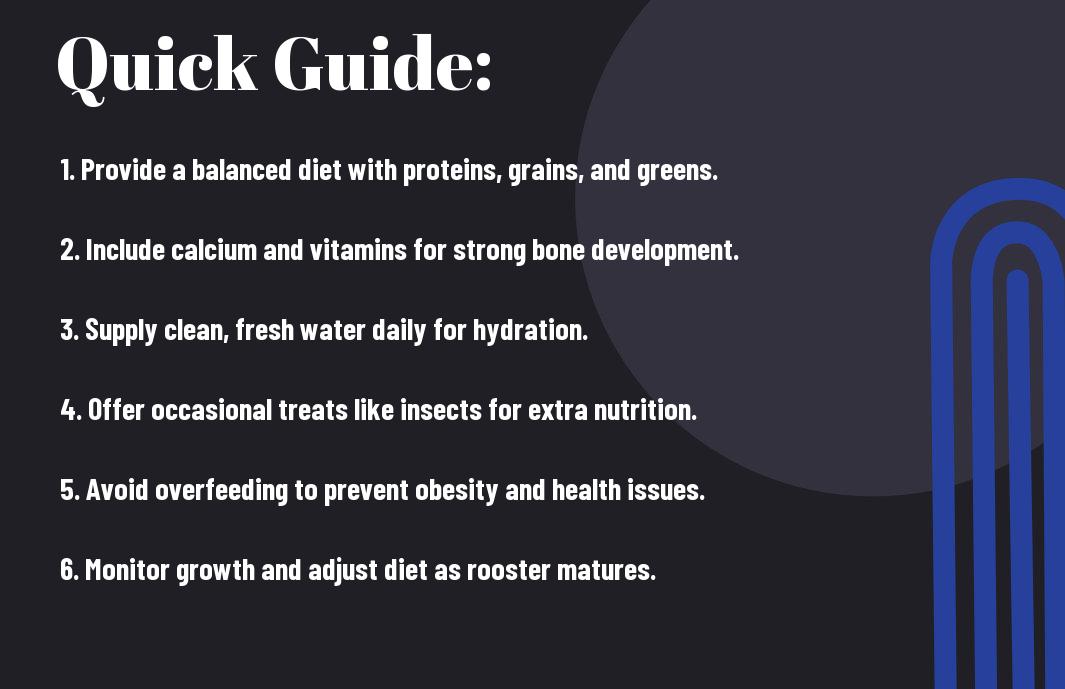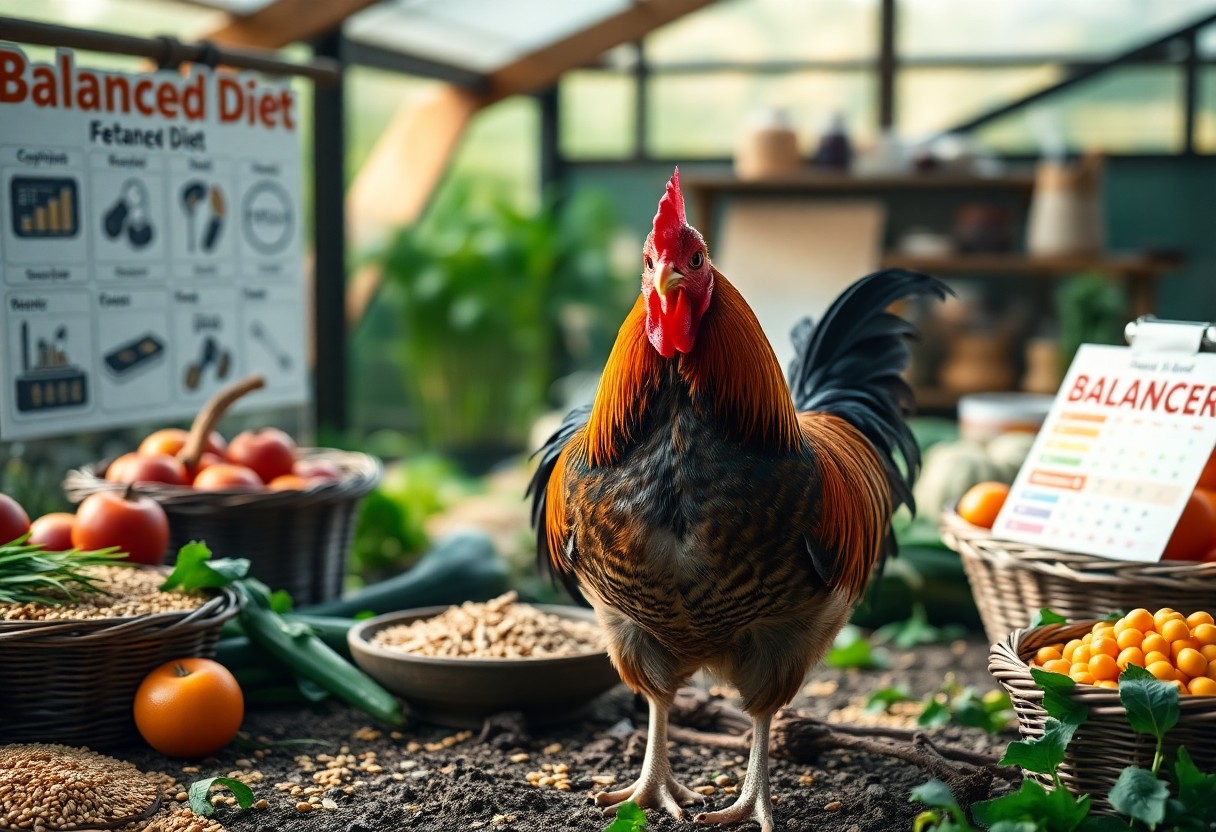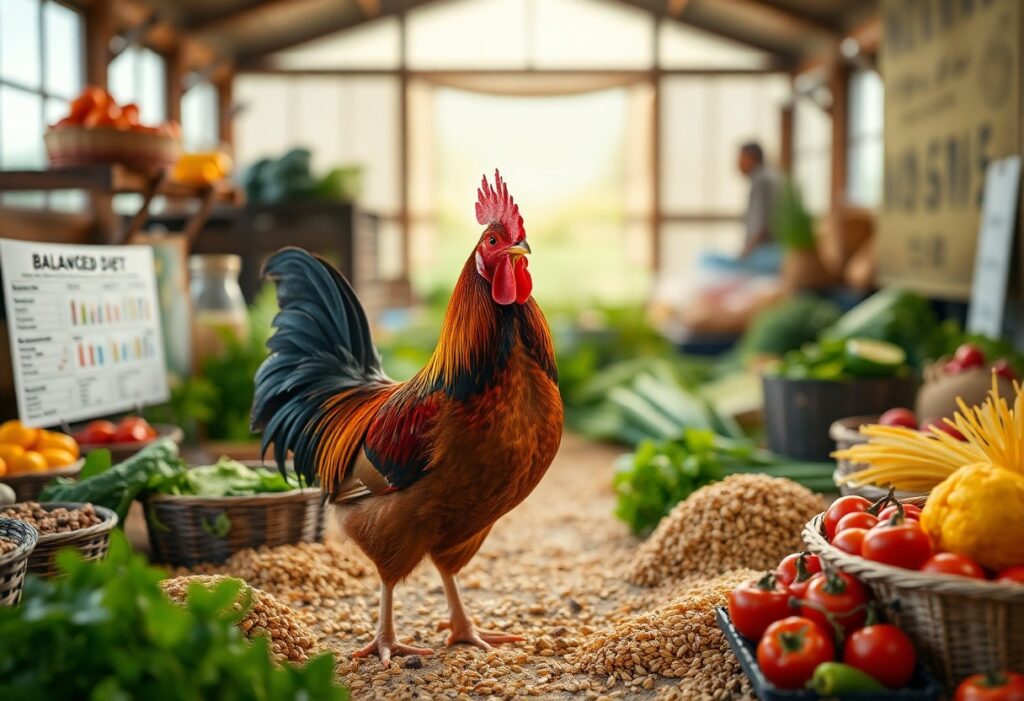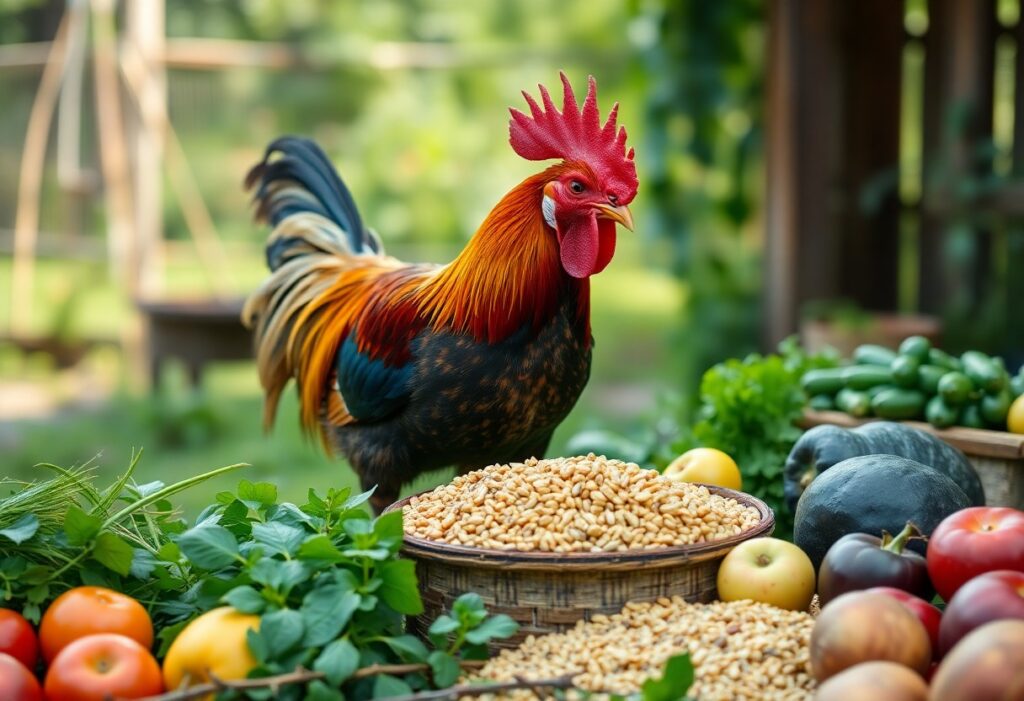Nutrition plays a vital role in fostering optimal growth and well-being in your roosters. By understanding the specific dietary needs of these birds, you can ensure that their development is both healthy and robust. You will learn about the important nutrients, the importance of a balanced diet, and the potential consequences of nutritional deficiencies. This guide will equip you with the knowledge to make informed decisions about your roosters’ feed and supplements, promoting vitality and longevity in your flock.
Key Takeaways:
- Balanced nutrition is necessary for the optimal growth and development of roosters, including a mix of proteins, vitamins, and minerals.
- Proper feeding schedules and portion control help prevent obesity and promote a healthy metabolism in roosters.
- Regular access to fresh water and a clean living environment are key components of a successful nutrition plan for roosters.


Understanding Rooster Nutrition
A well-balanced diet is fundamental for optimal rooster development. It fuels their growth and supports their health, ensuring they’re capable of fulfilling their roles in the flock. Providing the right nutrients will contribute to their overall vigor and reproductive performance. You need to ensure that their diet encompasses all required components, which will lead to healthier roosters in your care.
Types of Nutrients Essential for Growth
- Proteins: Vital for growth and muscle development.
- Carbohydrates: Provide energy for daily activities.
- Fats: Offer concentrated energy and aid nutrient absorption.
- Vitamins: Essential for various bodily functions and immunity.
- Minerals: Crucial for bone growth and overall health.
| Nutrient Type | Function |
| Proteins | Foundation for muscle and tissue development |
| Carbohydrates | Main energy source for roosters |
| Fats | Energy storage and nutrient absorption |
| Vitamins | Support metabolic processes |
| Minerals | Support skeletal structure and functions |
Factors Influencing Nutritional Needs
On your journey to raise healthy roosters, be aware that several factors affect their nutritional needs. Age, breed, activity level, and environment all play significant roles in determining the right balance of nutrients. Acknowledging these influences ensures that you cater to their specific requirements and optimize their growth.
- Age: Younger roosters have higher protein needs for growth.
- Breed: Different breeds have varying nutritional requirements.
- Activity Level: Active roosters require more energy from food.
- Environment: Climate and housing can impact nutrient absorption.
- Health Status: Sick roosters may need adjusted diets.
Understanding these aspects allows you to tailor your feeding strategies effectively. For instance, younger roosters will need higher levels of proteins for their development compared to older ones, who may focus more on maintenance. Furthermore, breeds like broilers might need more energy-dense food than characterized layers. Adaptation to your specific flock’s circumstances will yield better results and healthier roosters in your care. After you assess these factors, you can make informed decisions about their diet.
Recommendations for Optimal Feeding
Some key aspects of feeding your roosters include providing a balanced diet that meets their specific nutritional needs. It’s necessary to select high-quality feeds that contain the right proportions of protein, carbohydrates, vitamins, and minerals to support healthy growth and development. Regularly monitor their feed intake and adjust based on their activity levels and overall health to ensure they thrive.
Tips for Selecting the Right Feed
Tips for selecting the right feed include considering the following:
- Check the ingredients for quality and freshness
- Choose feeds with a balanced nutrient profile
- Look for organic options when possible
- Consult local experts or vets for specific recommendations
Perceiving quality feed as an investment will lead to better growth and health outcomes for your roosters.
Step-by-Step Guide to Balancing Diet
Balancing your roosters’ diet involves understanding their nutritional needs and how to meet them effectively. Below is a simple guide to achieve this:
Diet Balancing Steps
| Step | Description |
|---|---|
| 1 | Determine your rooster’s age and activity level. |
| 2 | Select a feed formula appropriate for their age. |
| 3 | Include supplements if necessary for vitamins and minerals. |
| 4 | Provide access to clean water at all times. |
| 5 | Monitor their health and adjust feed accordingly. |
It is necessary to give your roosters a balanced diet regularly. This means understanding their specific requirements and ensuring they receive adequate macronutrients and micronutrients. Adjustments may be necessary as roosters mature. The transition stages—while they grow, mature, and even lay eggs—should be observed to maintain a healthy plan. Maintaining proper nutrition will not only enhance growth but also improve their overall well-being. Tailor their diet according to their changing needs to help them thrive.
Key Considerations
| Considerations | Importance |
|---|---|
| Protein levels appropriate for growth | Enhances muscle development and overall health |
| Adequate calcium for bone strength | Essential for laying hens and keeps roosters healthy |
| Quality of feed and water | Directly affects health and performance |
Assessing Nutrition Plans
Despite the varying nutritional needs of roosters during different development stages, understanding and evaluating nutrition plans is imperative. You should assess how effective the current feeding regimen is in supporting balanced growth, health, and overall well-being. Regularly reviewing your rooster’s condition will help you determine if any adjustments are necessary to optimize their diet and nutritional intake.
Pros and Cons of Various Feeding Approaches
Clearly, each feeding approach has distinct advantages and drawbacks that affect the health of your roosters. The table below outlines key points to consider as you evaluate different strategies.
Pros and Cons of Various Feeding Approaches
| Pros | Cons |
|---|---|
| Promotes balanced nutrition | Can be costly |
| Supports healthier growth | Requires careful planning |
| Encourages behavioral enrichment | May not suit all breeds |
| Easy to manage with proper scheduling | Time-consuming to prepare |
| Allows for targeted nutrient delivery | Risk of over-supplementation |
| Increases egg production in hens | Requires adjustments as they grow |
| Enhances immune system | Potential for waste if not managed |
| Cultivates a strong flock dynamic | Needs continuous education |
| Can be customized for specific needs | May create dependency on commercial feeds |
Key Signs of Nutritional Deficiency
Little attention to your rooster’s nutrition can lead to noticeable signs of deficiency. It is vital to observe their behavior, appearance, and overall health to pinpoint any diet-related issues.
With adequate monitoring, you can identify key symptoms such as feather loss, reduced energy levels, and poor appetite, which may signal a lack of imperative nutrients. Other indicators include weakness, emaciation, and changes in droppings. Paying attention to these signs will enable you to make timely adjustments to your rooster’s diet, promoting better health and development. It’s your responsibility to provide a balanced diet to prevent these deficiencies and ensure your roosters thrive.
Final Words
On the whole, understanding nutrition for healthy rooster development empowers you to make informed choices that positively impact their growth and well-being. By providing a balanced diet rich in necessary nutrients, you support their physical health and enhance their productivity. Incorporate whole grains, proteins, vitamins, and minerals into their routine while monitoring their intake to ensure optimal results. With your dedication and knowledge, you can raise strong, healthy roosters that thrive for years to come.
FAQ
Q: What are the key nutrients needed for healthy rooster development?
A: Healthy rooster development requires a balanced diet rich in important nutrients. Key nutrients include proteins, which help in muscle development and growth; carbohydrates, which provide energy for daily activities; fats, which are vital for hormonal health and energy; vitamins such as A, D, and E that support immunity and overall health; and minerals like calcium and phosphorus that are important for bone strength and reproductive health. It is important to offer a mix of seeds, grains, vegetables, and a protein source, such as mealworms or insects, to ensure roosters receive a well-rounded diet.
Q: How can I tell if my rooster is getting proper nutrition?
A: Signs of proper nutrition in roosters can be observed in their physical appearance and behavior. Healthy roosters will have bright, vibrant plumage, clear eyes, and an active demeanor. They should have a good body weight without being overly fat or thin. Additionally, healthy roosters will exhibit normal behavior, such as crowing, foraging, and engaging socially with other flock members. Regularly monitoring their weight and overall health, as well as consulting with a veterinarian if any concerning signs arise, can help ensure optimal nutrition.
Q: What are some common dietary mistakes to avoid when raising roosters?
A: There are several dietary mistakes to avoid for optimal rooster health. One common mistake is providing an imbalanced diet lacking important nutrients, which may lead to developmental issues or health problems. Over-reliance on a single type of feed can also be detrimental, as it may not meet the diverse nutritional needs of roosters. Additionally, omitting fresh vegetables and protein sources can lead to deficiencies. Lastly, avoid overfeeding or providing scraps that may be high in salt or sugar, which can harm their digestive health. Regularly assessing their diet and making adjustments as necessary will support their growth and well-being.











